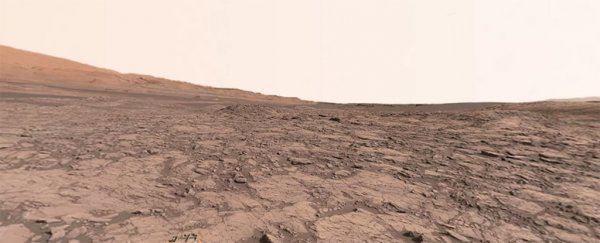If you've ever wondered what it might be like to be inside of a giant crater on Mars, then check out this incredible footage NASA released this week from its Curiosity Mars rover. The video above is interactive, making the experience more realistic than simply looking at a picture. Just click on the video and drag your mouse across the screen to scan the Martian landscape like never before.
We recommend you select the highest quality available from the settings option in the lower right, and you'll need a recent version of Chrome, Opera, Firefox, or Internet Explorer for it to work properly.
What you're seeing here is a brand new landscape unlike anything the Curiosity rover has encountered before during its time inside of Gale Crater, which is 96 miles (154 kilometres) wide. The region is called Bagnold Dunes, which is just one of the many areas on Mars covered with vast, active sand dunes.
Right now, Curiosity is scooping sand from a nearby mound, called Namib Dune (shown below), which is between 13 to 17 feet (4 to 5 metres) tall:

To the right of Namib Dune, you can see Mount Sharp in the distance. The Bagnold Dunes are located on the northwestern flank of Mount Sharp, which is a mountain at the center of Gale Crater.
Mount Sharp is about three miles (5 kilometres) high with channels etched along its face, which scientists suspect were carved by flowing water at some point in Mars' distant past.

And if you look closely at the shot below, you'll see a line straight down the middle that connects the two halves of the panorama. It's easier to see if you look into the distance at the rim of Gale Crater, shown below.
Most of the photos from Curiosity are actually a mosaic of tens of individual shots that scientists then stitch together into, what looks like, one amazing photo.

Stitching photos together takes time and effort, but, as you can see, it's absolutely worth it.
This article was originally published by Business Insider.
More from Business Insider:
